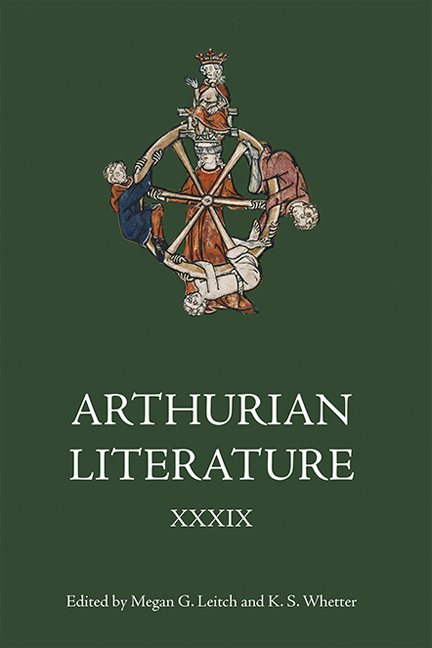Book contents
- Frontmatter
- Contents
- General Editors’ Preface
- List of Contributors
- List of Abbreviations
- 1 The Derek Brewer Essay Prize: Playing Arthur: Making the Elizabethan Mariner
- 2 Ignoring Arthur: Patterns of (In)Attention in Manuscripts of Latin Histories
- 3 ‘Þe place þat ȝe prece to ful perelous is halden’: The Evil Custom in Sir Gawain and the Green Knight
- 4 ‘aske bettyr, I counseyle the’: Requests, Conditions, and Consent in Malory’s ‘Sir Gareth of Orkney’
- 5 Supernatural Transformation in Malory’s Le Morte Darthur
- 6 Personal Piety and ‘semyng outeward’: Self and Identity in Thomas Malory’s ‘Tale of the Sankgreal’
- 7 Evil Will and Shameful Death: Revisiting Law in Malory’s Morte Darthur
- 8 The Return of the Return of Mordred
- In Praise of Elizabeth: Beyond the Books
- Announcement and Details of the Derek Brewer Prize
- Contents of Recent Previous Volumes@
6 - Personal Piety and ‘semyng outeward’: Self and Identity in Thomas Malory’s ‘Tale of the Sankgreal’
Published online by Cambridge University Press: 08 May 2024
- Frontmatter
- Contents
- General Editors’ Preface
- List of Contributors
- List of Abbreviations
- 1 The Derek Brewer Essay Prize: Playing Arthur: Making the Elizabethan Mariner
- 2 Ignoring Arthur: Patterns of (In)Attention in Manuscripts of Latin Histories
- 3 ‘Þe place þat ȝe prece to ful perelous is halden’: The Evil Custom in Sir Gawain and the Green Knight
- 4 ‘aske bettyr, I counseyle the’: Requests, Conditions, and Consent in Malory’s ‘Sir Gareth of Orkney’
- 5 Supernatural Transformation in Malory’s Le Morte Darthur
- 6 Personal Piety and ‘semyng outeward’: Self and Identity in Thomas Malory’s ‘Tale of the Sankgreal’
- 7 Evil Will and Shameful Death: Revisiting Law in Malory’s Morte Darthur
- 8 The Return of the Return of Mordred
- In Praise of Elizabeth: Beyond the Books
- Announcement and Details of the Derek Brewer Prize
- Contents of Recent Previous Volumes@
Summary
The relationship between selfhood and identity has perhaps never received as much attention, either critically or in the mainstream media, as now. The proposed changes in the Gender Recognition Act (2004) address the process of how an individual can have their acquired gender recognised without having to undergo intrusive medical procedures or complete overly complicated bureaucratic processes, and aim to redress the balance between how an individual identifies themselves and the way in which an individual is treated publicly. At the same time, discussions surrounding the process of self-declaration have raised questions about how an individual can receive public recognition of the person they are internally, the way in which public services should be amended to allow for this, and how the rights of different groups can be simultaneously protected by law. That the sense of self is not necessarily a permanent construct is mirrored by the request to remove the clause ‘until death’ from the Statutory Declaration, in acknowledgement of the fact that ‘there are some cases where some individuals might regret their decision to transition’. At the centre of these conversations are the relationship between internal and external markers of identity, the difference between self and identity, and the problems that can exist when the two do not correlate.
While current conversations about self-identification frequently focus on gender, the disjunction between self and identity and the tensions that these conversations can raise are topics that have long literary pre-histories. Not only did Sir Thomas Malory live through a period of civil strife during the Wars of the Roses (overtly referenced in his speech addressed to ‘ye all Englysshemen’ at the end of the Morte Darthur) but his own life and personal circumstances were markedly volatile.3 Peter Field notes that documentary evidence of Malory's life ‘records accusations of violent crimes that many readers have felt were incompatible with the ideals of chivalry that they saw embodied in Le Morte Darthur’. This contradiction between Malory's personal identity (as defined by the criminal acts for which he was charged but never convicted) and Malory's authorial identity (as a champion of chivalry) is reflected by similar tensions between public and private, exterior and interior, and collective and individual actions throughout the text.
- Type
- Chapter
- Information
- Arthurian LiteratureA Celebration of Elizabeth Archibald, pp. 104 - 138Publisher: Boydell & BrewerPrint publication year: 2024

